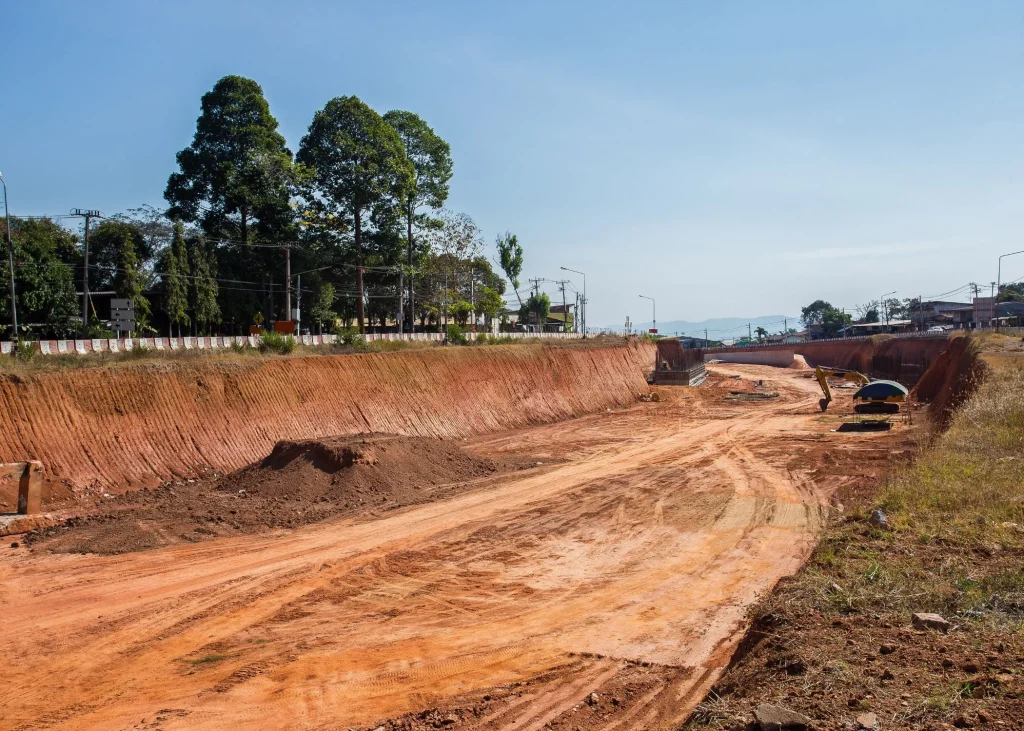- Home
- Grading Services
Grading Services
Your Backyard
Since 2000, Robinson Landscape has steadily grown into a trusted and successful company because of our highly professional work, attention to detail, and outstanding customer service. Contact Us Today!
Professional Grading Services in Bucks County & Southeastern PA
Grading services in Bucks County are essential for proper property development, drainage management, and site preparation across residential and commercial properties. Robinson Landscape, a licensed contractor serving Southeastern Pennsylvania and New Jersey since 2000, specializes in comprehensive grading solutions including site grading, finish grading, land grading, excavation grading, drainage grading, and property leveling. With over 25 years of experience, owner Tim Robinson and his expert team transform uneven terrain into functional, beautiful properties while solving drainage problems, preparing construction sites, and creating level surfaces for landscaping, driveways, pools, buildings, and outdoor living spaces.
Proper grading is the foundation of every successful property improvement project. Whether you’re preparing land for new construction, solving persistent drainage issues, restoring property after pool removal, or leveling your yard for better usability, professional grading ensures lasting results that protect your investment and enhance property value throughout Bucks County, Montgomery County, and beyond.
What You Need to Know About Grading Services
What
- Professional land grading and property leveling services that reshape terrain to achieve proper drainage, create level building sites, prepare land for construction or landscaping, correct erosion problems, and establish proper slopes and contours. Services include rough grading, finish grading, drainage grading, site preparation, and final surface preparation.
Where
- Robinson Landscape serves all of Bucks County, Montgomery County, Southeastern Pennsylvania, Central New Jersey, and South Jersey—including Doylestown, Newtown, Warminster, Buckingham, Lansdale, Horsham, Abington, and surrounding communities throughout the region.
Who
- Homeowners preparing for landscaping or construction projects, property developers requiring site preparation, buyers addressing grading issues discovered during inspections, property owners with drainage problems, and anyone needing land leveling for pools, patios, driveways, additions, or yard improvements.
When
- Grading is essential before construction projects, after demolition or removal projects like pool removal, when addressing drainage and erosion problems, during property development and subdivision work, for landscape renovation and outdoor living space creation, and whenever terrain prevents optimal property use.
Why
- Proper grading prevents water damage and foundation problems, creates usable outdoor spaces from sloped or uneven terrain, prepares stable foundations for construction projects, increases property value and curb appeal, solves persistent drainage and erosion issues, and ensures compliance with building codes and regulations.
How
- Licensed professionals assess existing terrain and drainage patterns, develop grading plans meeting project requirements and codes, use specialized excavation equipment to reshape land precisely, establish proper slopes directing water away from structures, compact soil to prevent settling, and create finished surfaces ready for landscaping, construction, or hardscaping.
Investment
- Project-based pricing determined by property size, existing terrain conditions, grading complexity, drainage requirements, accessibility, and desired final grade. Robinson Landscape provides transparent, detailed estimates after free on-site consultation—no hidden fees or unexpected costs.
Contact Robinson Landscape Today!
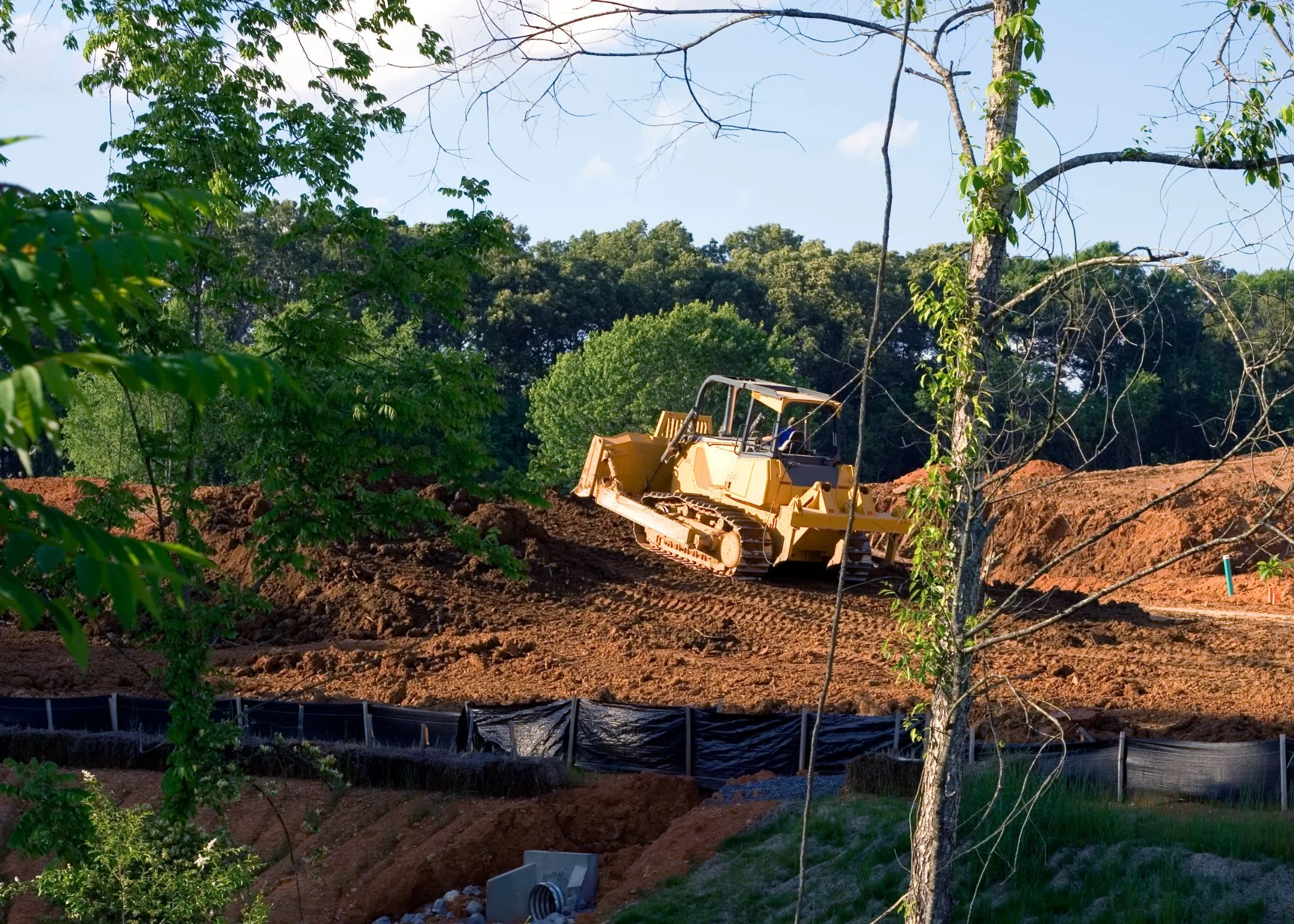
Comprehensive Grading Services
Understanding Professional Grading
Grading is both art and science—reshaping land to achieve functional beauty while managing water flow and creating stable surfaces. In 25 years serving Southeastern Pennsylvania, we’ve graded everything from small residential yards to large commercial developments. Every property presents unique challenges, from Bucks County’s clay soils to Montgomery County’s varied terrain.
Professional grading requires understanding drainage principles, soil mechanics, local codes, and construction best practices. It’s not simply pushing dirt around—it’s precision work that determines whether your property thrives or suffers from water problems, settling, erosion, and structural issues for decades to come.
What's Included in Professional Grading Services
Our comprehensive approach begins with thorough site assessment and planning
- We evaluate existing topography, identify drainage patterns and problem areas, assess soil conditions and composition, review property boundaries and easements, and understand your project goals and timeline. This assessment allows us to develop the optimal grading plan for your specific situation.
Rough grading establishes major contours and elevations
- We remove or redistribute large amounts of soil, create proper slopes and drainage patterns, establish building pads and level areas, and prepare the site for utilities and infrastructure. This phase dramatically transforms your property's terrain.
Fine grading refines surfaces to precise specifications
- We achieve exact elevations required for construction, create smooth, even surfaces for landscaping, establish final drainage slopes, and remove rocks, debris, and irregularities. Fine grading is where precision matters most—minor elevation errors cause major drainage problems.
Drainage grading specifically addresses water management
- We create swales and berms directing water flow, establish positive drainage away from buildings, prepare for drainage systems like French drains, and correct existing drainage problems causing standing water or erosion.
Compaction ensures stability and prevents settling
- We compact fill material in proper lifts, achieve density requirements for construction, prevent future subsidence and low spots, and create stable surfaces supporting structures, driveways, and hardscaping.
Finish work prepares your property for its next phase
- We spread topsoil for landscaping areas, create seed beds for lawn establishment, prepare surfaces for sod, hardscaping, or construction, and ensure smooth transitions and proper drainage throughout.
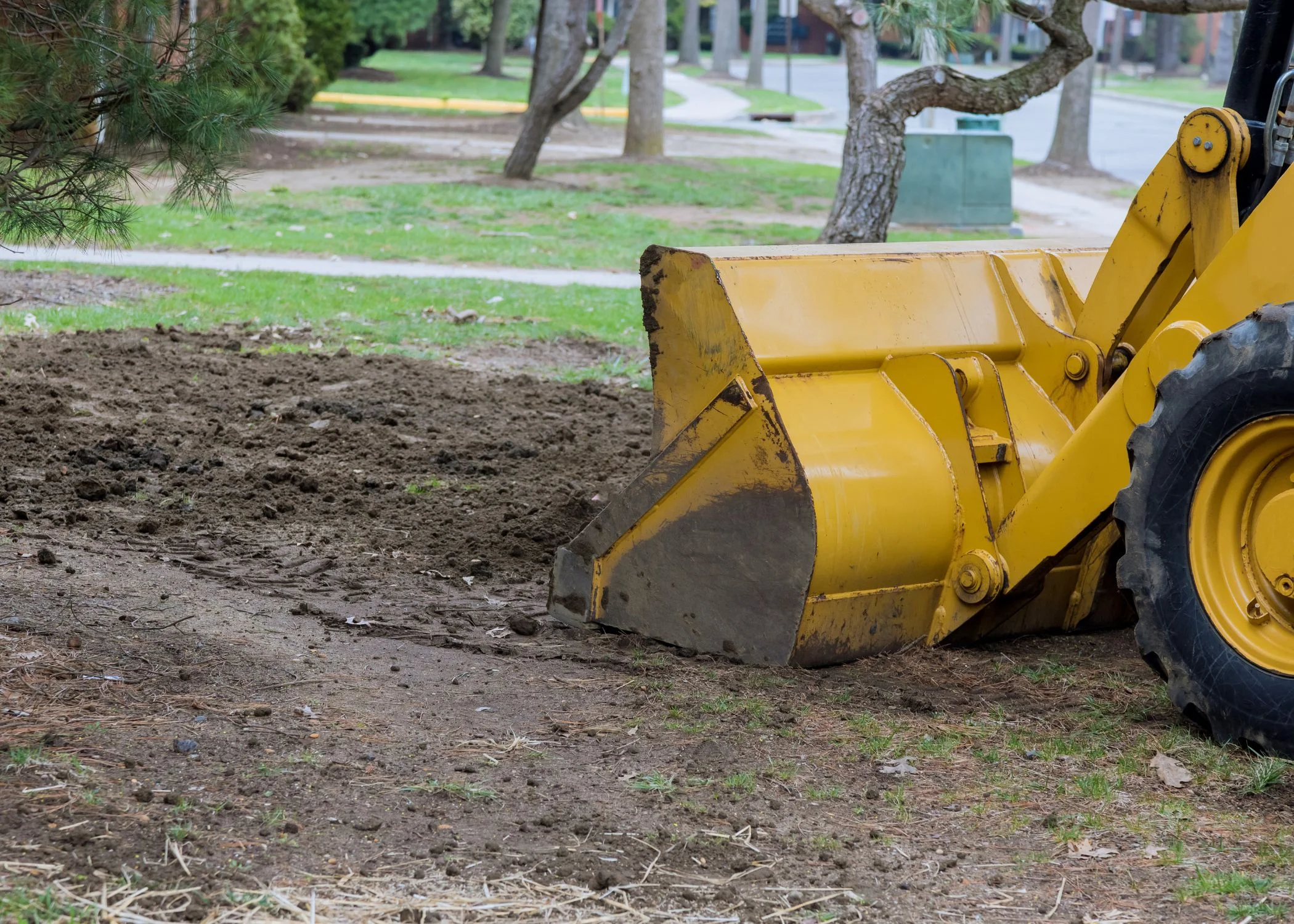
What's NOT Included (But We Can Coordinate)
While our grading services are comprehensive, some specialized work requires additional contractors. Utility installation like water, sewer, electric, and gas lines typically involves utility contractors, though we prepare sites perfectly for this work. Hardscaping installation including patios, retaining walls, and pavers are specialty services we can refer. Building foundation work requires foundation contractors, though our site preparation gives them perfect working conditions. Landscape design and planting are services we can coordinate after grading is complete.
Types of Grading Services We Provide
Site Grading for New Construction
Preparing properties for new construction is among our most common and important services. Building sites must meet precise elevation requirements, have proper drainage, and provide stable foundations. We work with builders, architects, and homeowners to transform raw land into construction-ready sites.
Our site grading establishes building pads at exact elevations specified in plans, creates access for construction vehicles and equipment, establishes proper drainage slopes away from building locations, prepares utility corridors and connection points, and ensures compliance with building codes and engineering specifications. The result is a site ready for foundation work with drainage that protects the building for its lifetime.
Finish Grading and Land Leveling
Finish grading creates the final surface for your property. This precision work determines whether your lawn drains properly, whether you have usable outdoor space, and whether your landscaping thrives. We've finish graded thousands of properties across Bucks County and Montgomery County, creating beautiful, functional outdoor spaces.
Finish grading includes preparing sites after pool removal or demolition, creating level yards for play areas and outdoor entertaining, establishing proper grades for lawn installation, preparing surfaces for sod or hydroseeding, correcting uneven terrain and drainage problems, and creating smooth transitions between different yard areas.
Drainage Grading and Water Management
Water is the enemy of properties when it's not properly managed. We've solved countless drainage problems throughout Southeastern Pennsylvania—from minor puddling to major erosion and foundation damage. Drainage grading redirects water away from problems and toward proper outlets.
Our drainage solutions include creating swales channeling water to appropriate areas, establishing berms preventing water from entering problem zones, grading away from foundations and structures, preparing for French drain and drainage system installation, correcting negative slopes causing water pooling, and restoring proper drainage after construction or landscaping projects.
Excavation and Rough Grading
Large-scale terrain modification requires heavy excavation and earth moving. Whether you're developing raw land, creating level areas from slopes, or preparing for major projects, our excavation grading services handle substantial earth work efficiently and precisely.
Excavation grading services include removing unsuitable soil and replacing with proper fill, creating level building sites from sloped terrain, cutting and filling to achieve desired elevations, preparing driveways and access roads, creating retention ponds and drainage features, and mass grading for subdivisions and developments.
Property Leveling and Restoration
Many properties need grading improvements to correct problems or restore functionality after other work. Property leveling transforms unusable spaces into valuable outdoor areas while solving problems like erosion, poor drainage, and terrain irregularities.
We provide property leveling after pool removal and filling, correction of settlement and low spots, leveling for outdoor structures like sheds and garages, restoration after utility work or trenching, creation of usable yard space from slopes, and general property improvement and value enhancement.
Why Bucks County & Montgomery County Trust Robinson Landscape
25+ Years of Local Grading Expertise
Since founding Robinson Landscape in 2000, Tim Robinson has built a reputation for grading excellence across Southeastern Pennsylvania. Our quarter-century of experience means we understand local conditions, regulations, and challenges that affect every grading project in our region.
We know Bucks County's heavy clay soils require different approaches than Montgomery County's varied terrain. We're familiar with municipal codes in Doylestown, Warminster, Horsham, and every community we serve. We've worked with local builders, engineers, and inspectors, building relationships that benefit our clients through smoother approvals and better project coordination.
Understanding Pennsylvania's Unique Challenges
Southeastern Pennsylvania's climate creates specific grading challenges. Freeze-thaw cycles cause soil movement and settling that improperly graded sites can't withstand. Heavy spring rains test drainage systems to their limits. Summer storms bring intense rainfall that overwhelms inadequate grading.
Our grading plans account for these regional realities. We establish grades that handle Pennsylvania's weather extremes, use compaction techniques preventing freeze-thaw damage, and create drainage solutions managing our area's rainfall patterns. This local expertise means grading that performs year after year, not just at completion.
Soil Conditions Across Our Service Area
Soil varies dramatically across Bucks County and Montgomery County. Lower Bucks County's heavy clay soils hold water and require careful drainage planning. Upper Bucks County's rocky terrain presents excavation challenges. Montgomery County's varied geology means adjacent properties can have completely different soil characteristics.
We assess soil conditions on every project, adjusting our approach accordingly. Clay soils might require additional drainage features. Rocky sites need specialized equipment. Sandy soils compact differently than clay. Our experience with regional soils ensures grading that works with, not against, your property's natural conditions.
Licensed, Insured, and Professionally Certified
Robinson Landscape maintains comprehensive licensing and insurance protecting every grading project:
Pennsylvania Contractor License PA071368
Full authorization for grading and excavation work throughout Pennsylvania
New Jersey Contractor License 13vh08112100
Complete licensing for New Jersey projects
Philadelphia License #46245
City-specific licensing for Philadelphia County work
OSHA Certification #36-900440038
Workplace safety certification ensuring proper safety protocols
These credentials mean you’re working with legitimate professionals who carry proper insurance, follow safety standards, meet code requirements, and provide recourse if issues arise. Unlicensed grading contractors may offer lower prices, but they can’t provide the protection and professionalism licensed contractors deliver.
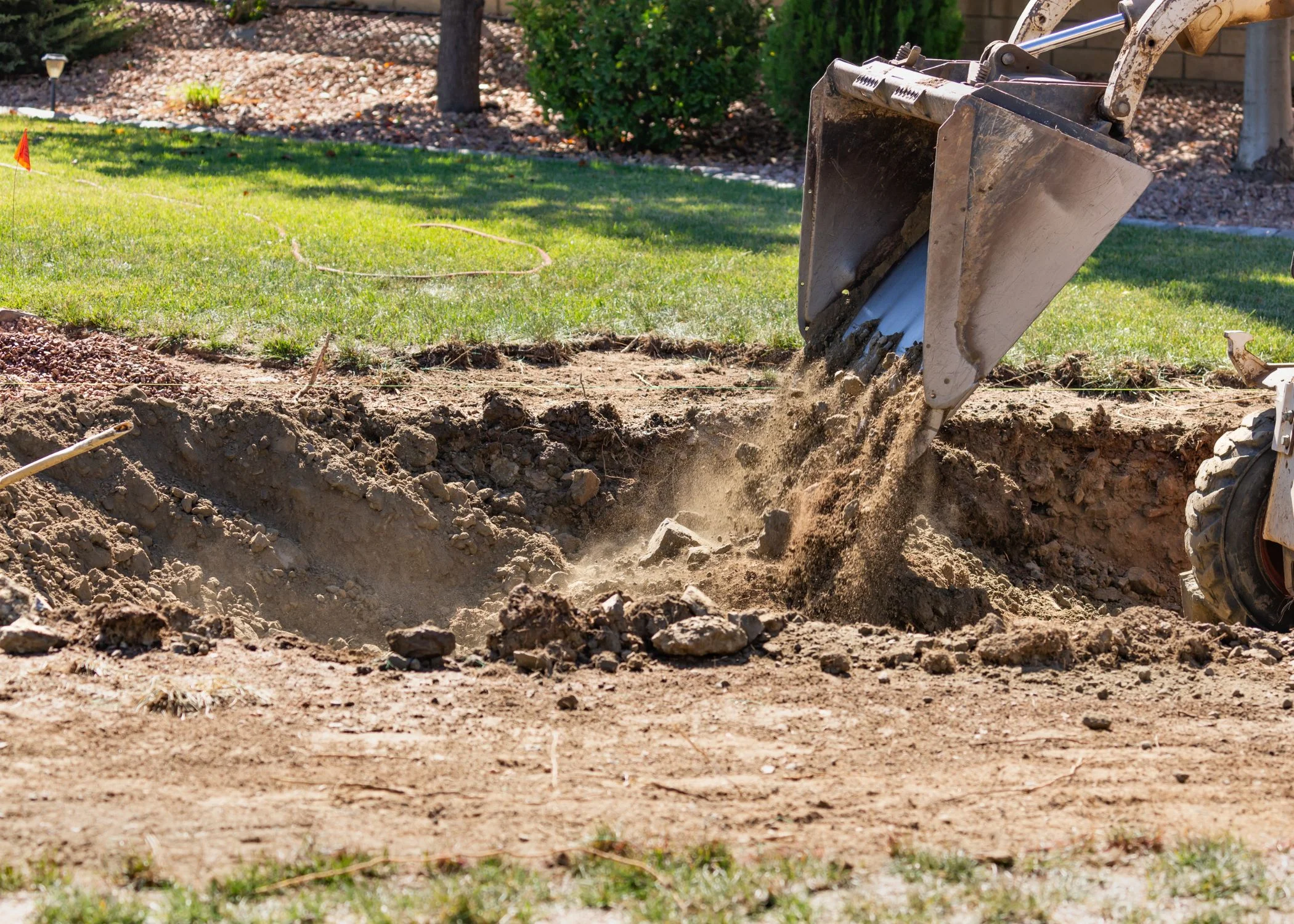
Specialized Equipment for Precision Grading
Professional grading requires specialized heavy equipment operated by experienced professionals. Robinson Landscape maintains a modern fleet including excavators for major earth moving and terrain shaping, bulldozers for large-scale grading projects, skid steers for fine grading and compact areas, grading boxes and laser levels for precision work, and compaction equipment ensuring proper density.
Our equipment investment ensures efficiency, precision, and versatility. We can handle any grading project—from small residential yards to large commercial sites—with appropriate machinery operated by trained professionals. This capability means faster project completion, better accuracy, and superior results.
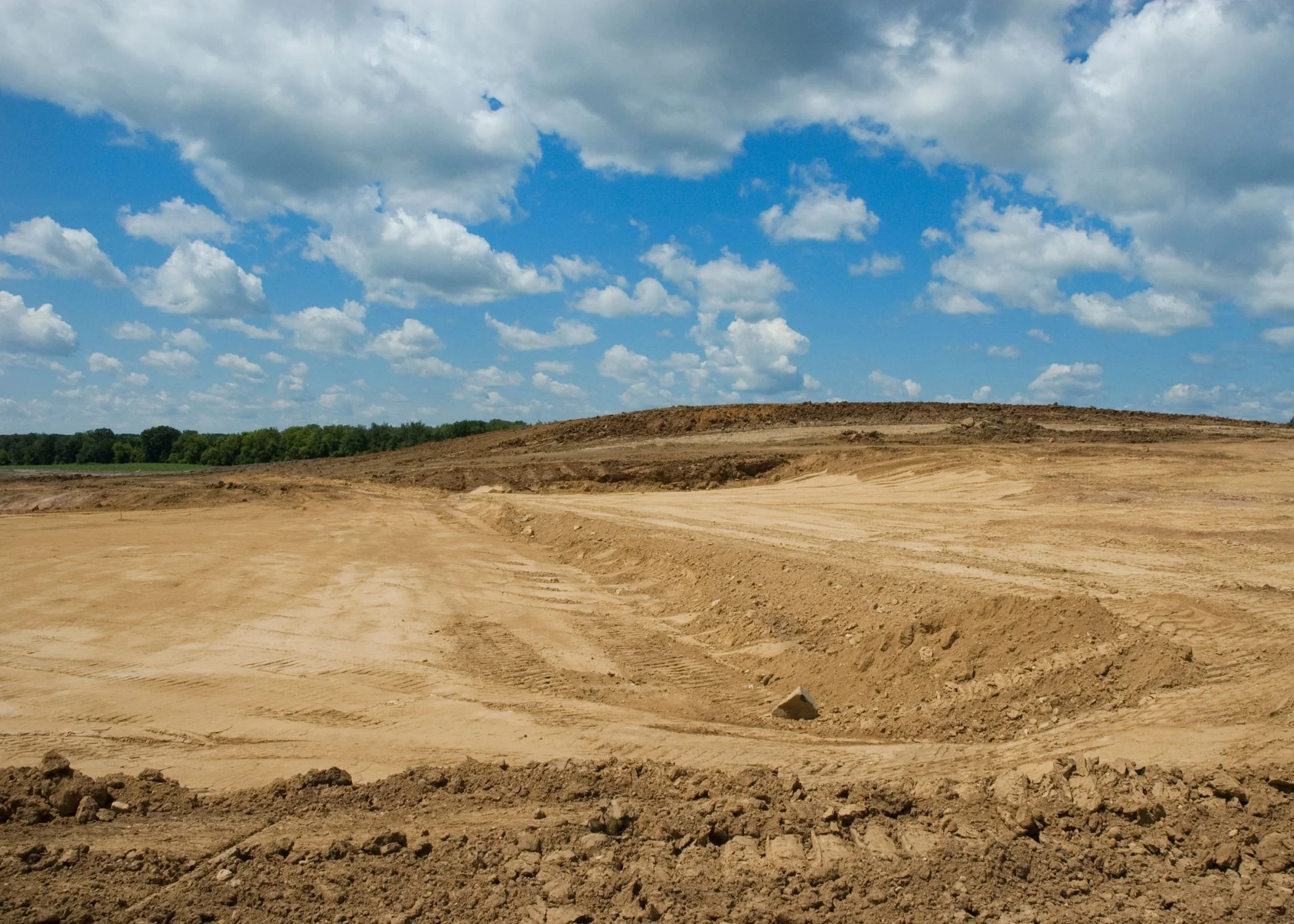
Commitment to Quality and Customer Satisfaction
Every grading project reflects on our reputation. We’ve built Robinson Landscape’s success on delivering work we’re proud of—grading that performs flawlessly, looks beautiful, and provides lasting value. This commitment to quality shows in everything we do.
We take time understanding your goals and concerns, communicate clearly throughout projects, pay attention to details other contractors overlook, stand behind our work with comprehensive satisfaction guarantees, and treat every property with the same care we’d want for our own homes.
Our customer reviews consistently mention our professionalism, quality work, clear communication, and the fact that we do what we promise. These aren’t accidental—they’re the result of intentional commitment to excellence on every project.
Our Proven Grading Process
Step 1
Free On-Site Assessment and Consultation
Every grading project begins with thorough on-site evaluation. Tim Robinson or a senior team member visits your property to understand your needs, assess existing conditions, and develop the optimal grading solution. This isn’t a quick glance—we invest time understanding your property’s unique characteristics.
During assessment, we walk the entire property observing current drainage patterns, identify problem areas and their causes, evaluate existing slopes and elevations, assess soil conditions and composition, discuss your goals, timeline, and budget, and identify potential challenges and solutions.
This comprehensive evaluation allows us to provide accurate, detailed estimates with realistic timelines. You’ll understand exactly what work your property needs, why it’s necessary, and how we’ll accomplish it. Many grading problems have multiple solutions—we explain options so you can make informed decisions.
Step 2
Grading Plan Development
Based on site assessment, we develop a detailed grading plan specific to your property. For complex projects, this might include formal engineering drawings. For simpler projects, detailed specifications guide our work.
Grading plans establish target elevations throughout the property, define drainage patterns and water flow directions, identify cut and fill areas, specify slope percentages and drainage grades, plan compaction requirements and methods, and coordinate with other project elements like utilities or construction.
We review plans with you, ensuring you understand the approach and goals. If your project requires engineering or municipal review, we coordinate these approvals, keeping your project moving forward smoothly.
Step 3
Site Preparation and Protection
Before grading begins, we prepare your property carefully. We mark property boundaries to prevent encroachment issues, identify and protect existing utilities, establish work areas protecting landscaping and structures, and set up erosion control measures when required.
For projects near existing structures, we take extra precautions protecting buildings, driveways, hardscaping, and landscaping features you’re keeping. We’ve learned that careful preparation prevents problems and shows respect for your property.
Step 4
Rough Grading and Major Earth Moving
Rough grading establishes major contours and moves large soil volumes. This is where dramatic transformation occurs—slopes become level areas, low spots are filled, high areas are cut, and overall terrain takes shape according to plan.
We work systematically, removing unsuitable soil when necessary, importing quality fill material as needed, establishing major drainage patterns, creating building pads and level areas, and continuously checking elevations against plan specifications.
Our experienced operators work efficiently while maintaining precision. We understand that rough grading sets the foundation for everything that follows—rushed or imprecise rough grading creates problems finish grading can’t fully correct.
Step 5
Drainage Feature Installation
During grading, we install drainage features managing water flow. This might include surface features like swales (shallow drainage channels), berms (raised areas directing water), and catch basins (collection points for drainage systems).
For properties needing subsurface drainage, we coordinate French drain installation, perforated pipe systems, and connection to storm sewers or drainage outlets. While some drainage work involves specialized contractors, we prepare sites perfectly and coordinate installation timing with grading work.
Proper drainage is arguably the most important aspect of grading. We’ve seen beautiful properties ruined by water problems stemming from poor drainage planning. Our experience solving drainage issues across Southeastern Pennsylvania informs every grading plan we develop.
Step 6
Compaction and Soil Stabilization
Compaction is critical for lasting grading results. Loose, uncompacted fill settles over time, creating low spots, drainage problems, and structural issues. Professional compaction prevents these problems.
We compact fill material in layers (lifts) typically 8-12 inches thick, use appropriate compaction equipment for soil type and project requirements, achieve density requirements for your project’s intended use, test compaction on projects requiring verification, and ensure stable surfaces supporting structures, driveways, and landscaping.
Proper compaction can’t be rushed. We invest the time doing it right because compaction quality determines whether your grading performs well for decades or develops problems within years.
Step 7
Fine Grading and Surface Preparation
Fine grading transforms rough-graded terrain into finished surfaces. This precision work requires skill and attention to detail. We establish exact final elevations, create smooth, even surfaces, remove rocks and debris larger than specifications allow, achieve perfect slopes for drainage, and prepare ideal surfaces for seeding, sodding, or construction.
Fine grading is where our experience truly shows. Minor elevation variations that seem insignificant during grading create noticeable problems once landscaping is established or construction proceeds. Our crews understand the precision fine grading requires and deliver surfaces meeting or exceeding specifications.
Step 8
Topsoil Placement and Final Preparation
For areas receiving landscaping, we spread quality topsoil over graded surfaces. Topsoil depth depends on your plans—typically 4-6 inches for lawn areas, deeper for gardens and planting beds. We grade topsoil to match final elevations, maintaining proper drainage slopes.
Final preparation includes fine raking creating smooth seed beds, removing remaining rocks and debris, establishing proper grades to property boundaries, and creating clean transitions to existing features.
The result is a property ready for your next phase—whether that’s seeding and hydroseeding for lawn establishment, sod installation for instant lawn, hardscaping and patio installation, or construction project commencement.
Step 9
Erosion Control and Site Stabilization
Freshly graded sites are vulnerable to erosion until vegetation establishes or construction proceeds. We implement appropriate erosion control measures including hydroseeding or seeding for quick vegetation establishment, erosion control blankets on steep slopes, silt fencing preventing sediment runoff, and stabilization measures meeting municipal requirements.
Proper erosion control protects your investment and demonstrates environmental responsibility. Many municipalities require erosion control plans for grading projects—we ensure compliance while protecting your property from storm damage during the critical period after grading.
Step 10
Final Inspection and Project Closeout
Before we consider a project complete, we conduct thorough final inspection with you. We walk the property reviewing all graded areas, verify drainage functions as designed, address any questions or concerns, and ensure you’re completely satisfied with results.
For projects requiring municipal inspections, we coordinate with local officials and secure final approvals. We provide documentation including grading plans and specifications, compaction test results if performed, erosion control implementation records, and before and after photographs.
This documentation provides valuable records for future reference, property sales, or additional construction projects.
Grading Services Throughout Southeastern Pennsylvania
Robinson Landscape proudly serves an extensive territory across Southeastern Pennsylvania and New Jersey. Our regional experience means we understand local conditions, regulations, and market expectations specific to your community.
Bucks County Communities
Doylestown, Newtown, Warminster, Bensalem, Buckingham, Lower Southampton, Hilltown, Northampton, Bedminster, Richland, Quakertown, Perkasie, Sellersville, Chalfont, New Hope, Yardley, Langhorne, Levittown, Bristol, Warrington, and all surrounding Bucks County townships.
Montgomery County Communities
Lansdale, Horsham, Abington, Cheltenham, Upper Dublin, Lower Moreland, Lower Providence, Upper Gwynedd, Norristown, King of Prussia, Plymouth Meeting, Ambler, Jenkintown, Willow Grove, Hatboro, Blue Bell, Fort Washington, Collegeville, and surrounding Montgomery County areas.
Additional Service Areas
Professional grading services extend throughout Southeastern Pennsylvania including Delaware County, Chester County, and Philadelphia County. Our New Jersey service area covers Central and South Jersey communities including Hamilton, Hopewell, Haddon Township, Mount Laurel, Cherry Hill, and surrounding regions.
Local Expertise for Every Community
From Doylestown’s historic properties requiring sensitive grading to Warminster’s post-war subdivisions needing drainage improvements to Horsham’s newer developments requiring precise finish grading, we understand your area’s specific characteristics. We’re familiar with local inspection requirements, common soil conditions, and typical project challenges.
This local knowledge translates to smoother projects, better outcomes, and fewer surprises. We know what works in Bucks County and Montgomery County because we’ve been grading properties here for 25 years.
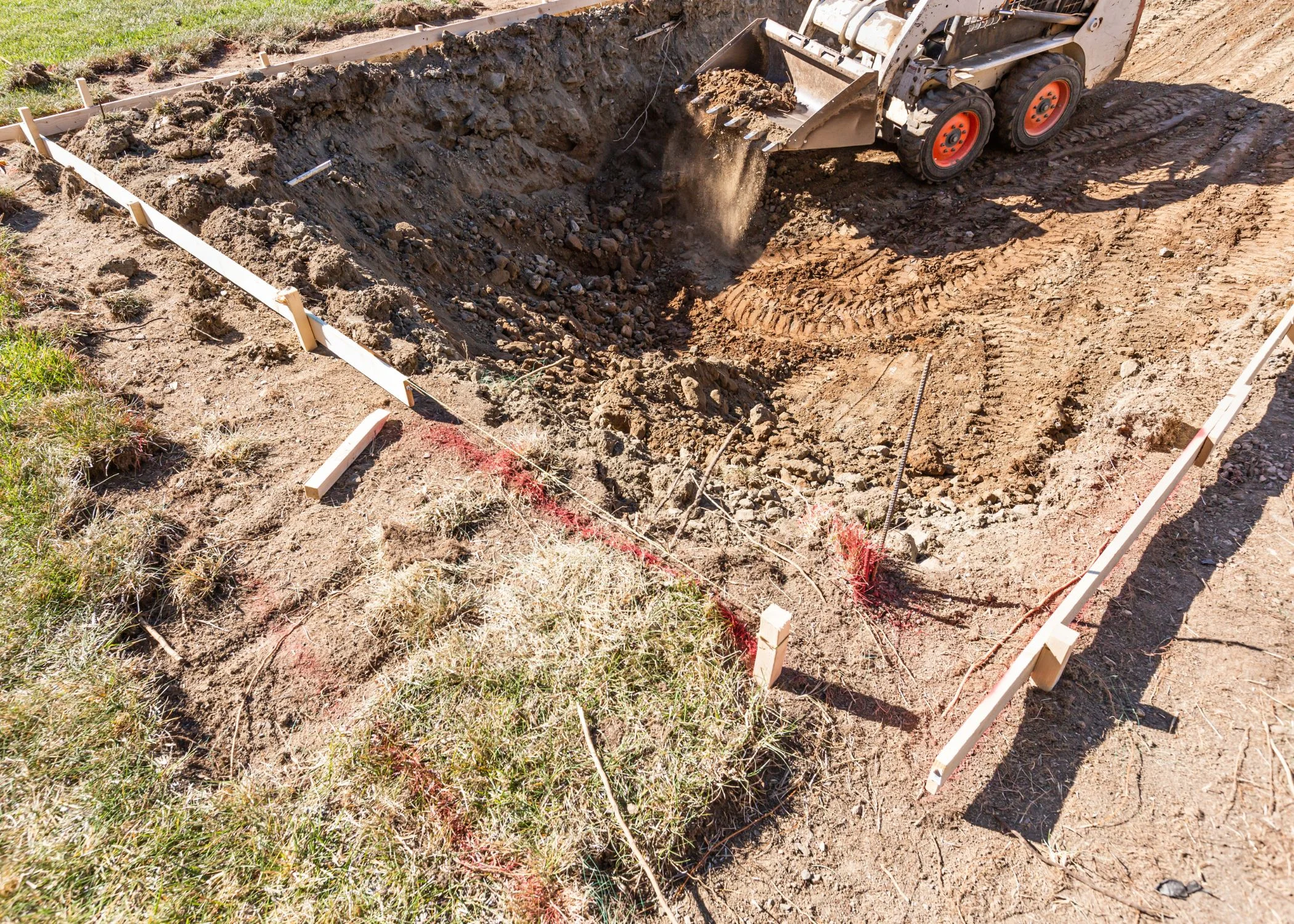
Investment and Value
Transparent, Project-Based Pricing
Grading projects vary tremendously in scope, making generic pricing impossible. Honest grading contractors provide estimates based on your specific property and requirements—not one-size-fits-all quotes that change dramatically once work begins.
Robinson Landscape provides detailed, transparent estimates after evaluating your property. You’ll understand exactly what work your project requires and what you’ll invest.
Factors Affecting Grading Project Costs
Property size directly impacts project scope
Grading a small residential yard costs less than grading a large property or commercial site. We price projects based on actual area requiring grading work.
Existing terrain conditions affect complexity and equipment needs
Relatively flat properties requiring minor grading corrections are simpler than heavily sloped sites needing substantial earth moving. Rocky terrain requires specialized equipment and additional time compared to grading soft, workable soil.
Amount of cut and fill determines material and labor requirements
Projects balanced between cutting and filling (where soil removed from high areas fills low areas) are more economical than projects requiring substantial import or export of material.
Drainage requirements add specialized work
Simple positive grading away from structures is straightforward. Complex drainage systems with swales, French drains, catch basins, and pipe systems require additional investment but solve serious problems.
Access and site constraints affect efficiency
Properties with easy equipment access and no obstacles grade faster than constrained sites requiring hand work, multiple equipment moves, or protection of numerous existing features.
Final surface requirements impact finishing work
Basic rough grading for construction sites requires less finish work than precision fine grading for lawn installation or patio preparation.
The Value of Professional Grading
Professional grading is a fundamental investment in your property’s functionality, value, and longevity. Consider what proper grading delivers:
Foundation and Structure Protection
- Correct grading directs water away from foundations, preventing the moisture problems, settling, and structural damage that cost tens of thousands to repair. We've seen homes with foundation problems caused by poor grading—problems entirely preventable with proper initial grading.
Usable Outdoor Space Creation
- Grading transforms sloped, uneven, or poorly drained areas into valuable usable space. Level yards become play areas, entertainment spaces, and landscape showcases. This functional space adds to your property's livability and value.
Long-Term Property Value
- Properties with proper grading command higher prices and sell faster than properties with drainage problems or unusable terrain. Professional grading is an investment that returns value during resale.
Prevention of Erosion and Loss
- Proper grading prevents soil erosion that literally washes your property away during storms. We've seen severe erosion damage on properties with poor grading—damage costing far more to fix than proper initial grading would have cost.
Construction Project Success
- Building on improperly graded sites creates lasting problems. Professional grading provides stable foundations, prevents water infiltration, ensures compliance with codes, and protects your construction investment.
Contact Us!
- Free estimates available - Call (215) 292-6572 or email tim@robinsonlandscape.com
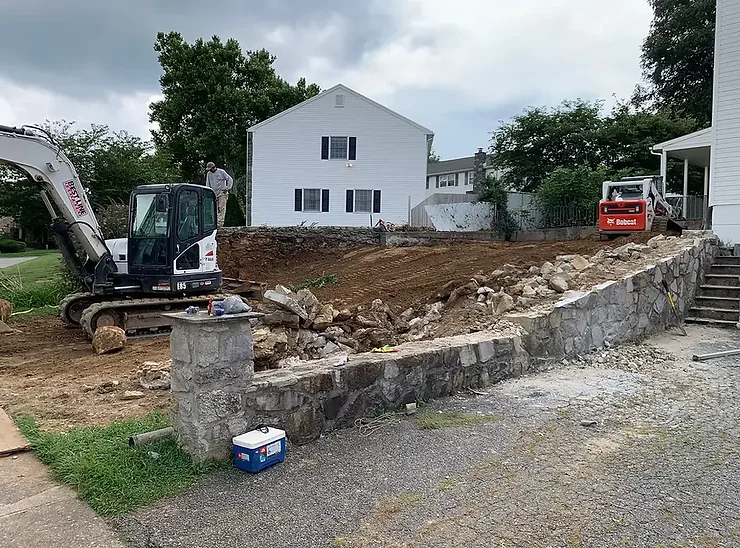
Free Consultation and Detailed Estimates
Robinson Landscape provides free on-site consultations with detailed written estimates. Tim Robinson or a senior team member personally evaluates your property, discusses your needs and goals, explains grading solutions and approaches, and develops accurate project estimates.
Our estimates include itemized breakdowns showing site preparation and planning, rough grading and earth moving, drainage feature installation, compaction and stabilization, fine grading and surface preparation, topsoil and finish work, erosion control implementation, and projected timeline.
You’ll understand exactly what you’re paying for and why each element is necessary. We welcome questions and explain every aspect of your project. Our goal is providing value through quality work, fair pricing, and transparent communication.
Frequently Asked Questions About Grading Services
Several signs indicate grading problems or needs on Bucks County and Montgomery County properties. Standing water or soggy areas after rain suggest negative drainage slopes or compacted soil preventing proper drainage. Water flowing toward your foundation instead of away indicates dangerous grading problems requiring correction. Erosion gullies in your yard show that water is channeling improperly during storms. Uneven or sloped areas limiting yard usability mean grading could create functional outdoor space. Settling or low spots in previously graded areas suggest improper compaction during earlier work. If you're planning construction projects, proper site grading is essential. Robinson Landscape can assess your property during a free consultation, identifying any grading issues and explaining solutions.
Rough grading and finish grading serve different purposes in the overall grading process. Rough grading establishes major contours and terrain features, moves large volumes of soil to create desired elevations, establishes general drainage patterns and slopes, prepares building pads and level areas, and typically achieves grades within several inches of final specifications. Finish grading refines surfaces to exact specifications, creates smooth, even surfaces for landscaping or construction, achieves precise elevations and slopes, removes rocks and debris for final surface quality, and prepares ideal conditions for seeding, sodding, or paving. Think of rough grading as sculpting the basic shape and finish grading as perfecting the details. Most comprehensive projects require both phases for optimal results.
Grading project timelines vary significantly based on property size, project complexity, and weather conditions. Small residential grading projects for yards or drainage correction typically take 1-3 days of active work. Medium-sized projects involving site preparation for construction or significant property leveling usually require 3-7 days. Large-scale grading for commercial sites or major residential developments can take several weeks or months depending on scope. Weather significantly impacts timelines—rain delays excavation and grading work, while proper conditions allow steady progress. We provide realistic timeline estimates during consultation and communicate proactively about any schedule changes. Most residential grading projects in Bucks County and Montgomery County are completed within one week of active work.
Excavated soil is managed based on quality, quantity, and your project needs. Quality topsoil is typically stockpiled on-site and reused for final surface preparation in landscape areas. Subsoil suitable for fill is often redistributed to low areas on your property, minimizing material costs. Excess soil may be exported to approved disposal sites or other projects needing fill material. Poor quality soil containing excessive rock, debris, or contamination is removed and disposed of properly. For projects requiring more fill than existing soil provides, we import quality fill material meeting project specifications. Our goal is balancing cut and fill efficiently, minimizing unnecessary material import or export while ensuring your property has proper soil for its intended use. We discuss soil management plans during consultation so you understand how we'll handle material on your specific project.
Most drainage problems can be solved or significantly improved through proper grading. We've resolved thousands of drainage issues across Southeastern Pennsylvania using grading solutions. Common drainage problems we fix include water flowing toward foundations instead of away, standing water or soggy areas in yards and low spots, erosion caused by concentrated water flow, basement moisture from poor surface drainage, and water accumulation near structures, driveways, or patios. Grading solutions include establishing proper slopes directing water away from problems, creating swales channeling water to appropriate drainage areas, building berms preventing water from entering problem zones, preparing for French drain and subsurface drainage installation, and correcting negative slopes that trap water. During site assessment, we identify drainage problem causes and design grading solutions addressing root issues, not just symptoms. In some cases, grading works together with drainage systems like French drains for comprehensive water management.
Permit requirements for grading work vary by municipality across Bucks County, Montgomery County, and Southeastern Pennsylvania. Many communities require permits for grading projects involving significant earth moving (typically defined by volume or area), grading that alters drainage patterns, site preparation for new construction, and work within environmentally sensitive areas. Some municipalities have thresholds—for example, requiring permits only for projects moving more than a certain amount of soil or affecting areas larger than specified sizes. Robinson Landscape is familiar with requirements in every community we serve. During consultation, we determine whether your project requires permits and handle all applications, inspections, and approvals if needed. Working with permitted contractors ensures compliance with local codes and provides documentation protecting property values during future transactions.
Grading can be performed year-round in Southeastern Pennsylvania, though seasonal conditions affect efficiency and outcomes. Spring and fall are generally ideal—soil moisture levels are moderate, temperatures are comfortable for crews, and weather is typically more predictable. Summer grading works well except during prolonged heat or drought when dust control becomes challenging and very dry conditions can complicate compaction. Winter grading is possible during mild periods but frozen ground, snow, and ice create challenges. Very wet conditions in any season delay work—grading requires relatively dry conditions for proper compaction and equipment operation. For projects involving final seeding or sodding, spring (April-May) and fall (September-October) provide optimal conditions for grass establishment. That said, project timing often depends more on your schedule and project needs than ideal seasonal conditions. We've successfully completed grading projects in every season across Bucks County and Montgomery County. During consultation, we discuss timing considerations specific to your project and goals.
Grading's impact on existing landscaping depends on project scope and planning. For minor grading projects or finish grading work, existing landscaping outside the work area typically remains undisturbed. We establish work zones protecting plants, trees, and features you're keeping. For major grading projects involving significant terrain changes, some landscaping disruption is unavoidable. However, we minimize impact through careful planning and protection measures. Trees and established plantings can often be preserved by avoiding their root zones when possible, protecting trunks and root flares during equipment operation, maintaining existing grades around valuable specimens, and coordinating grading transitions to minimize disturbance. Lawns within grading areas are typically removed and replaced with new seeding or sod after grading is complete. We discuss landscaping considerations during site assessment, identifying what can be preserved and planning protection strategies. For properties with valuable landscaping, careful planning allows grading improvements while protecting your landscape investment.
Site preparation grading for new construction involves comprehensive work ensuring stable, properly drained building sites that meet code requirements and engineering specifications. Our construction site grading includes clearing and removing vegetation, debris, and existing structures from the construction footprint, establishing building pads at precise elevations specified in construction plans, creating proper slopes directing water away from building locations, preparing stable subgrades meeting bearing capacity requirements, establishing access routes for construction vehicles and equipment, rough grading utility corridors for water, sewer, electric, and gas connections, implementing erosion control measures protecting the site during construction, and coordinating with builders, engineers, and inspectors throughout the process. We've prepared countless construction sites across Bucks County and Montgomery County for homes, additions, garages, commercial buildings, and other structures. Our precision site grading gives builders perfect conditions for foundation work and ensures properties have proper drainage protecting structures for their lifetime.
Blending new grading into existing terrain is crucial for natural-looking results and proper function. Our experience grading thousands of properties has taught us how to create seamless transitions. We carefully survey existing grades surrounding the work area, design grading plans that blend naturally into existing terrain, create gradual slope transitions rather than abrupt changes, match elevations at property boundaries and existing features, and ensure drainage flows consistently across transitions without creating problems. This attention to blending is particularly important for partial property grading—like restoring areas after pool removal or correcting drainage in yard sections—where new grading must integrate naturally with unchanged areas. The goal is grading that looks and performs as if it's always been that way. Our finish grading expertise ensures smooth, natural-looking transitions that enhance rather than detract from property aesthetics.
Soil testing and engineering requirements depend on project type, size, and local regulations. Simple residential grading for landscaping or drainage correction typically doesn't require formal engineering or testing. Larger projects or those with specific challenges may benefit from geotechnical soil testing to evaluate bearing capacity and soil composition, percolation testing for properties with septic systems or drainage concerns, engineering grading plans for complex projects or municipal requirements, and compaction testing verifying fill material meets density specifications. For projects requiring testing or engineering, we coordinate with qualified professionals and incorporate their recommendations into grading plans. Commercial developments, subdivision work, and projects in environmentally sensitive areas typically have more extensive testing and engineering requirements. We're experienced working with engineers and testing firms, ensuring your project meets all technical requirements while staying on schedule and budget.
Expert Insights from Tim Robinson
Professional Perspective on Grading Excellence in Southeastern Pennsylvania
In 25 years of grading properties across Bucks County and Montgomery County, I’ve learned that grading is the foundation—literally and figuratively—of nearly every successful property improvement project. Poor grading creates problems that haunt properties for decades. Excellent grading solves existing problems while preventing future issues.
The most important message I share with property owners is this: grading isn’t just about making land level or flat—it’s about managing water. Water is simultaneously your property’s greatest asset and its biggest potential threat. Proper grading harnesses water’s positive aspects while protecting your property from water damage.
Common Grading Mistakes I See
The most frequent error is attempting major grading without professional expertise. Property owners rent equipment, push some dirt around, and create drainage disasters worse than original conditions. Grading requires understanding drainage principles, soil mechanics, and proper techniques. What looks level to untrained eyes often has subtle negative slopes causing water to pool.
Another common mistake is inadequate compaction. Fill material that isn’t properly compacted settles over time—sometimes years later—creating low spots, drainage problems, and structural issues. I’ve seen driveways crack, patios sink, and yards develop depressions because compaction was rushed or skipped. Proper compaction can’t be shortcut—it requires the right equipment, proper technique, and patience.
Ignoring property boundaries causes problems too. Grading that directs water onto neighboring properties creates disputes and potential liability. We’re careful ensuring drainage stays on your property or flows to proper outlets. Pennsylvania has laws about water drainage and property rights—professional grading respects these requirements.
What Makes Grading Projects Successful
The best grading projects share common characteristics: clear understanding of project goals and priorities, realistic expectations about timelines and site disturbance, trust in professional recommendations when site conditions differ from assumptions, and commitment to doing the work right rather than cutting corners.
Weather cooperation is crucial for grading work. We can’t control rain, but we can be flexible about scheduling. Property owners who understand weather’s impact and work with us on timing adjustments get better results than those demanding rigid schedules regardless of conditions.
Communication prevents problems. When property owners tell us about concerns, preferences, and plans for spaces we’re grading, we can incorporate these considerations into grading plans. Surprises after grading is complete—like “I wanted to put a shed there” or “I didn’t realize we’d lose that tree”—are frustrating for everyone and often avoidable with upfront discussion.
Grading Trends and Regional Considerations
I’m seeing increased focus on sustainable drainage solutions. More property owners want grading that manages water naturally rather than simply piping it away. Swales, rain gardens, and natural drainage features are popular alternatives to traditional storm sewers. These solutions work beautifully when properly designed and graded.
Climate change is affecting grading requirements. Pennsylvania is experiencing more intense rainfall events—storms that drop several inches in hours rather than days. Grading and drainage systems must handle these extreme events, not just average conditions. We’re designing with greater capacity and resilience than past standards required.
Development pressure in Bucks County and Montgomery County means grading more challenging sites. Easy-to-grade properties were developed decades ago. Today’s projects often involve slopes, poor soils, or constrained sites requiring creative solutions. Our experience and equipment capabilities allow us to grade properties other contractors can’t handle.
My Recommendations
If you’re considering any property improvement—construction, landscaping, pool installation, or drainage correction—start by evaluating your grading. Many projects succeed or fail based on foundation grading provides. Invest in professional grading assessment before committing to other improvements.
For properties with drainage problems, address them sooner rather than later. Water damage compounds over time. Foundation problems, erosion, and landscape damage worsen with every storm. Professional grading solutions typically cost less than repairing accumulated water damage.
Work with licensed, experienced grading contractors who understand local conditions. Pennsylvania’s clay soils, freeze-thaw cycles, and variable weather require regional expertise. Contractors from other regions may not understand our specific challenges. Local experience matters tremendously in grading work.
Conclusion & Next Steps
Professional grading services transform properties by creating proper drainage, establishing level surfaces, preparing construction sites, and solving terrain challenges throughout Bucks County, Montgomery County, and Southeastern Pennsylvania. Robinson Landscape brings 25+ years of regional expertise to every grading project, combining technical knowledge with genuine commitment to customer satisfaction and lasting quality.
Key Takeaways
- Proper grading is fundamental to property functionality and value, preventing water damage while creating usable outdoor space
- Professional grading requires specialized equipment and expertise that DIY approaches and unqualified contractors cannot provide
- Comprehensive grading includes site assessment, drainage planning, proper compaction, and finish work—not just moving dirt
- Local experience matters tremendously in understanding Pennsylvania's soils, weather, and regulations
- Project-based pricing provides transparency with detailed estimates reflecting your property's specific needs
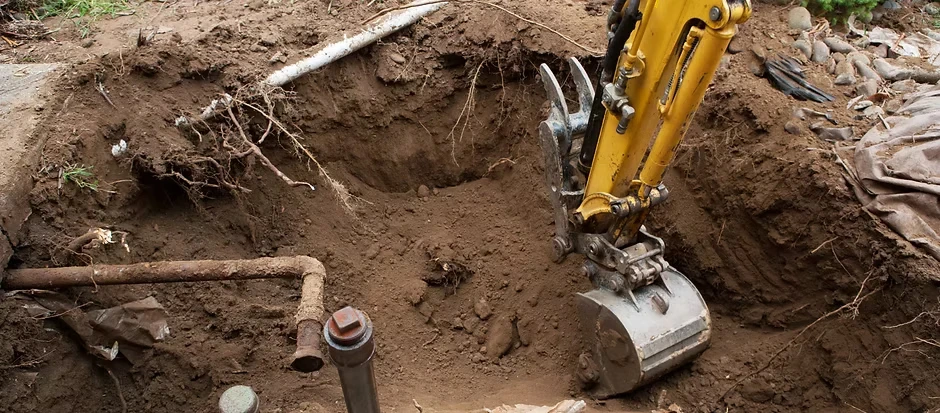
Transform Your Property with Professional Grading
Contact Robinson Landscape today for your free on-site consultation. Tim Robinson or a senior team member will personally evaluate your property, discuss your grading needs and goals, explain optimal solutions for your situation, and provide a detailed written estimate with no obligation.
Call (215) 292-6572 to speak directly with our team and schedule your free grading consultation.
Email tim@robinsonlandscape.com to discuss your grading project and timeline.
Serving Bucks County, Montgomery County, and all of Southeastern Pennsylvania with professional grading excellence since 2000.
Robinson Landscape—your trusted partner for grading services that protect your property, enhance functionality, and deliver lasting value. Licensed, insured, OSHA certified, and committed to grading excellence.
